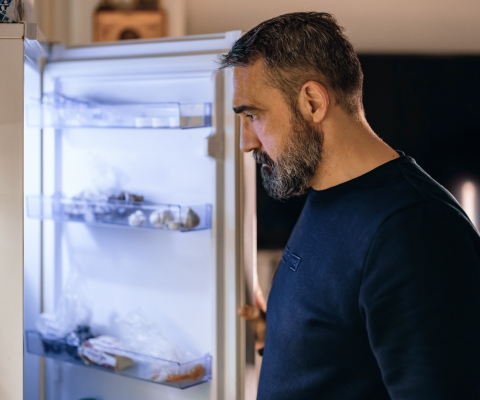
5 Ways to curb stress eating
Manage stress eating with these 5 strategies
We all do it — eat for reasons other than hunger. Sometimes, that craving for a brownie isn’t about your stomach grumbling: it’s your mind telling you that you need a break. If you’ve ever found yourself snacking in the face of stress, you’re not alone.
Stress eating is a common response to life’s challenges and stressors. However, there are ways to recognize this habit and change the way you deal with stress. Here are five strategies to help your curb stress eating.
1. Build awareness around your habits
The first step in breaking free from stress eating is to become aware of your habits. Make a conscious effort to note what you eat and the emotions you’re experiencing in the moment. Are you reaching for that bag of chips during a tough work meeting, or does a chocolate bar magically appear in your hand when dealing with a family disagreement? By recognizing the patterns and emotions that trigger your stress eating, you can begin to take control.
2. Make sure you’re getting enough rest
Fatigue and stress often go hand in hand. When you’re tired, your resilience against stress triggers weakens. You’re more likely to resort to stress eating as a way to cope. Make sure you’re getting enough restful sleep. A well-rested mind and body are better equipped to handle stress, reducing the chances of stress-driven cravings.
Interested in Vida? Download the app today!


Interested in Vida? Download the app today!
Download Vida Health from the app store on your phone to sign up. You’ll need to select your employer or health as your organization to check your eligibility.
Enter your mobile number and we’ll text you a link to download the app. You’ll need to select your employer or health plan as your organization to check your eligibility.
3. Eat regularly throughout the day
Allowing yourself to become excessively hungry can intensify stress-eating urges. When you’re ravenous, the sensations of stress can feel more overwhelming. Make it a point to eat regular, balanced meals to keep your hunger in check. Snacking on wholesome, nutrient-rich foods can also help prevent those impulsive trips to the snack cupboard.
4. Introduce healthier coping mechanisms
Once you’ve identified the stressful moments that lead to stress eating, you can prepare to tackle them head-on. Instead of reaching for a sugary treat, try alternatives like drinking a glass of water, sipping on herbal tea, or snacking on something healthy like a piece of fruit or a handful of nuts. Deep breathing exercises can also work wonders in calming your stress in the moment. Find what works best for you and have these strategies at the ready when stress strikes.
5. Address your stress at its source
Ultimately, if you want to put an end to stress eating, you need to deal with the stress itself. If the stressor is something you can control, invest time in developing stress management strategies. It might involve setting boundaries at work, addressing relationship issues, or managing your time more effectively. By taking proactive steps, you can tackle the root cause of your stress.
Remain mindful of your stressors
On the other hand, some stressors are beyond your control. If you can’t change what’s stressing you out (like traffic jams or unexpected life events), it’s really important to acknowledge that not everything can be managed or fixed. It’s okay to admit when you can’t change your circumstances.
Begin the process of letting go and accepting the situation for what it is.
While all types of foods can play a role in a healthy diet, it’s essential to understand that a brownie won’t solve your stressful situation. Stress eating provides a temporary distraction, but won’t address the core problem.
Stress eating is a common response to life’s challenges, but it doesn’t have to be your default coping mechanism. By building awareness around your habits, you can take control of your stress responses. Focus on getting enough rest, eating well, and replacing stress eating with healthier alternatives.
Addressing the root causes of stress head-on will allow you to create lasting solutions and reduce the need for emotional eating. Remember, food might provide a momentary escape, but it won’t make your stress disappear.




